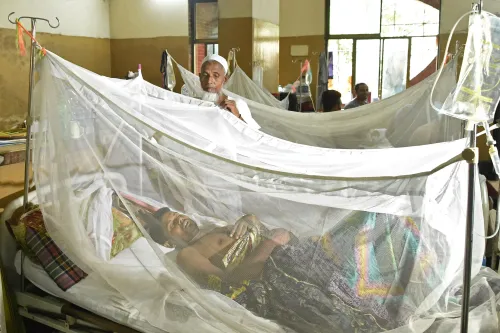Why Are One-Third of Australian Teenagers Facing Suicidal Thoughts?

Synopsis
Key Takeaways
- 34% of Australian teenagers reported suicidal thoughts.
- Suicidal ideation peaks at ages 16-17.
- 9% of males attempted suicide without prior thoughts.
- 42% of children face sleep issues.
- Education on sleep hygiene is crucial.
Canberra, Aug 19 (NationPress) A recent government report indicates that one-third of Australian teenagers have grappled with suicidal thoughts over the past year.
The findings, compiled by the Australian Institute of Family Studies (AIFS), disclosed that 34% of individuals aged 14 to 19 reported experiencing suicidal thoughts or behaviors within the last 12 months, as reported by the Xinhua News Agency.
Furthermore, the data revealed that 38% of females in this age group and 31% of males reported similar experiences.
This report draws from the Longitudinal Study of Australian Children (LSAC), a significant survey by AIFS that has monitored the development of 10,000 children and their families since 2004.
The research highlights that suicidal ideation, planning, and attempts peak around the ages of 16-17 for females, before showing a decline. For males, the peak also occurs at 16-17, but remains consistent until ages 18-19.
According to the report, 9% of males aged 14-19 attempted suicide without prior thoughts or planning, compared to 6% of females.
“This research underscores that suicidal thoughts and behaviors in youth are complex and often do not follow a predictable pattern,” stated Agatha Faulkner, senior survey manager at AIFS. “Some young people may attempt suicide without any previous indications, which can be devastating for their families and friends. Notably, for males, this behavior peaked at ages 14-15, indicating that mental health interventions must begin early.”
Additionally, a report from the Australian Institute of Health and Welfare (AIHW) released in April noted that suicide remains the leading cause of death for Australians between the ages of 15-24 and 25-44 in 2023.
Earlier in February, a survey found that nearly half of Australian children struggle with sleep issues.
Research from Melbourne’s Royal Children’s Hospital indicated that 42% of children aged 5-17 face problems like difficulty falling asleep and waking up during the night.
Among children aged 5-12, 45% reported sleep issues, versus 37% of those aged 13-17.
The survey also revealed that 21% of Australian children are not getting adequate sleep.
Furthermore, 44% of teenagers reported using screens in bed an hour before sleeping, while 47% of parents believe that screen time aids children in winding down.
“This study demonstrates that sleep pattern issues are prevalent among Australian school-aged children, spanning from younger kids to teens,” the report stated.
Interestingly, almost half of surveyed parents erroneously believe that excessive sleep is detrimental for teenagers, while 40% think that teens need significantly less sleep than younger children.
It is suggested that both parents and children would greatly benefit from enhanced education regarding sleep hygiene and support in adopting healthy sleep practices.
However, inadequate sleep can lead to sleep deprivation, resulting from insufficient or low-quality sleep. This may stem from lifestyle choices, job demands, and health conditions. Chronic sleep deprivation can adversely affect physical and mental health, leading to issues like impaired cognitive function, mood disturbances, and a weakened immune system. Regularly lacking sleep can result in serious long-term health complications, including heart disease, stroke, and diabetes.









